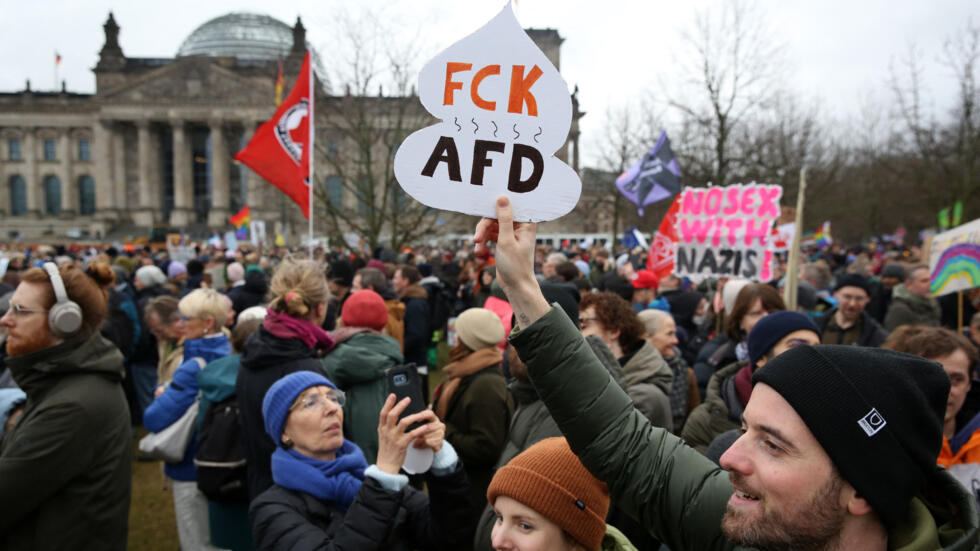By SAV, our sister organisation in Germany
On the weekend of 19–21 January, 1.5 million people protested against the far right in the largest wave of demonstrations in the history of the Federal Republic of Germany. 350,000 in Berlin, 130,000 in Hamburg, 200,000 in Munich, plus well over 100 demonstrations in smaller towns such as Eitorf, Buxtehude and Spremberg. They show the widespread outrage at the AfD’s (right wing populist party “Alternative for Germany”) deportation plans and at the general political shift to the right.
Previously, the investigative journalist website correctiv.org had reported on a meeting between fascists and representatives of the AfD and other bourgeois figures at which plans for mass “remigration”, i.e. the expulsion of people with a migrant background, were discussed. Among those wanting to expel people with a migrant background from Germany were not only open fascists such as the Austrian Martin Sellner (“Identitarian Movement”), but also the CDU (traditional right Christian Democratic Union) representatives and entrepreneurs. This shows that fascist plans for mass expulsion are being discussed right up to the CDU. Participants in this meeting were asked to donate 5,000 euros “for the cause” — this alone shows the clientele that was gathered.
In the spontaneous mass protests against these plans, politicians from bourgeois parties try to take the lead. Mayors and ministers invoke the “unity of democrats” against the AfD. They portray the movement as a defence of existing conditions and the ruling coalition parties of SPD, Greens and FDP against the AfD.
Government policy strengthens AfD
However, it is precisely because of these conditions and the government policy that the AfD has become the second strongest party in the polls and the strongest party in the East. Falling real wages, rising rents and social cuts have led to frustration and anger, particularly in eastern Germany. Against the backdrop of increasing insecurity worldwide, there is also a growing suspicion among the middle class and skilled workers that they are at risk of social decline.
Although the programme of the AfD has nothing to offer for the working population, the unemployed and pensioners, it is able to present itself as the only anti-establishment force, which is enough to gain mass support. At the same time, the AfD is benefiting from the wave of nationalism that all parties from the Greens to the CDU/CSU are propagating and from the right-wing culture war, for example against the climate movement and feminism.
For months, the established parties have been portraying migration as the biggest problem in Germany and blaming it for social problems such as housing shortages or the situation in underfunded schools. Since the so-called “Zeitenwende” (“turning point” that Scholz proclaimed at the background of the Ukraine war) in 2022, they have been engaged in a massive military and police build-up at the borders and ideologically stepping up talk about “defence” against nations or certain population groups. Since the beginning of the war in Gaza, there has also been agitation against Arabs, with demands for deportations and restrictions on political rights.
The recently passed “Rückführungsverbesserungsgesetz” (“Repatriation Improvement Act”, that simplifies deportations of asylum seekers) and planned camps at the EU’s external borders, exacerbate state racism. It is often claimed that the demands of the right must be partially met in order to take the wind out of their sails. However, adopting their narrative has the opposite effect — the AfD and its (potential) voters feel vindicated.
If the established parties are now embracing the demonstrations against the AfD and talking about “saving democracy”, this is hypocritical. These are the same parties that are responsible for brutally preventing people from other countries from entering Germany and harassing and racially oppressing them here. The” Ampel” (traffic light) coalition government is currently discussing only allowing naturalisation to people who do not receive social benefits. The Greens have adopted the European GEAS isolation system, which makes it more difficult for people to flee their home countries, which are also being destroyed by Europe’s neo-colonial policies, climate change or wars. The result is a German state that is only there for a better-off, white, wealthy upper class.
Class struggle against racism
We need a movement that can deprive the AfD of its breeding ground. It must fight against state racism and for social improvements in order to overcome the conditions that benefit right-wing forces.
The trade unions play a central role in this. They bring together workers with and without a migrant background and explain to their members the clash of interests between workers and capitalists. At the demonstrations, they must make it clear that it is not refugees who are to blame for the housing shortage and schools that are being cut back, but rather politics in the interests of the corporations. That the dividing line in society is not between “Germans” and “foreigners”, but between the masses of working people, pensioners and the unemployed and the ruling class of capitalists.
The Left Party must decide whether to passively support the protests and position itself as another “democratic party” alongside the SPD and the Greens or to distance itself from them, intervene with its own demands and take a clear stance against austerity policies and state racism.
Opportunities to put the AfD on the defensive
If the protests are led by the ruling parties in terms of content and external perception, they will not ultimately harm the AfD. The AfD will then continue to be confronted by a government with no prospects, which is also grotesquely inept at selling its policies for capital, with the CDU/CSU in between. AfD participation in government is getting closer, possibly with an initially unofficial AfD “toleration” (propping up) of a CDU minority government in an eastern federal state.
1.5 million people on the streets have impressively disproved the myth that the AfD represents the “silent majority” and encouraged many. There is huge potential for active resistance against the shift to the right. This must now be utilised, for example through concrete actions against the AfD in the upcoming election campaigns.
A ban on the AfD is currently being discussed in the press, with 42% in favour. But a ban harbours many dangers: racist ideology does not disappear through party bans, the right has a lot of experience in quickly reorganising itself and cooperation with the Werteunion (a conservative current in the CDU) is already very close. The “victim role” associated with a party ban would significantly strengthen the right and help them to pass off their anti-immigrant and anti-poor policies as supposedly consistent resistance to “left-green” politics. The policy of cuts in recent years and the new budget planning, which even proposes to cut disaster management, and the perceived lack of alternatives do the rest.
At the same time, there are more billionaires with more wealth than ever before — conditions that the AfD will make far worse despite cultivating its anti-establishment image. Moreover, such a ban, just like other legal manoeuvres, would end up being a boomerang for the movement, which the state would use not only against the right, but above all against left-wing structures and organisations.
Building strong social movements
We can only defeat right-wing parties and structures through joint, resolute resistance. It is encouraging to see tens of thousands of people everywhere taking to the streets against the AfD and racism. This shows that the AfD and its racist ideas are more isolated in society than it appears in the election polls. It is necessary to mobilise for local actions in schools and universities, at work and in neighbourhoods. The trade unions have a special responsibility in this regard, especially as their membership is also affected by right-wing agitation and politics and they have been a main target of Nazis and right-wing extremists since fascism. As the strongest workers’ organisation, the trade union federation DGB must launch a large-scale, consistent campaign against the right and use its full mobilisation potential. This does not mean rallies full of lip service, together with business organisations and the established parties, whose policies are helping the right wing to rise.
We must offer an alternative and make it clear that it is not the refugees who are responsible for the housing shortage, the collapse of the healthcare system and the education crisis, but the pro-capitalist parties. With demands for housing construction and the expropriation of property companies, for the defence of hospitals against plans to slash and burn and for more resources for education, we can show that a good life is possible for everyone — if we overcome capitalism and politics and the economy no longer serves to generate and secure profits, but to fulfil the needs of all.
Many people in Germany want solidarity-based solutions to the huge problems and crises ranging from social injustice to climate catastrophe. However, in the barrage of propaganda from the bourgeois parties, which present their positions as having no alternative, they lack political representation. The current mass protests can help to overcome the feeling of powerlessness and contribute to formulating positive demands: Redistribution from the top to the bottom instead of social cuts and state racism; anti-militarism instead of “belligerence”, ceasefire instead of arms deliveries to Ukraine and Gaza; planning in the interests of people and nature instead of climate collapse as a result of profit maximisation.











